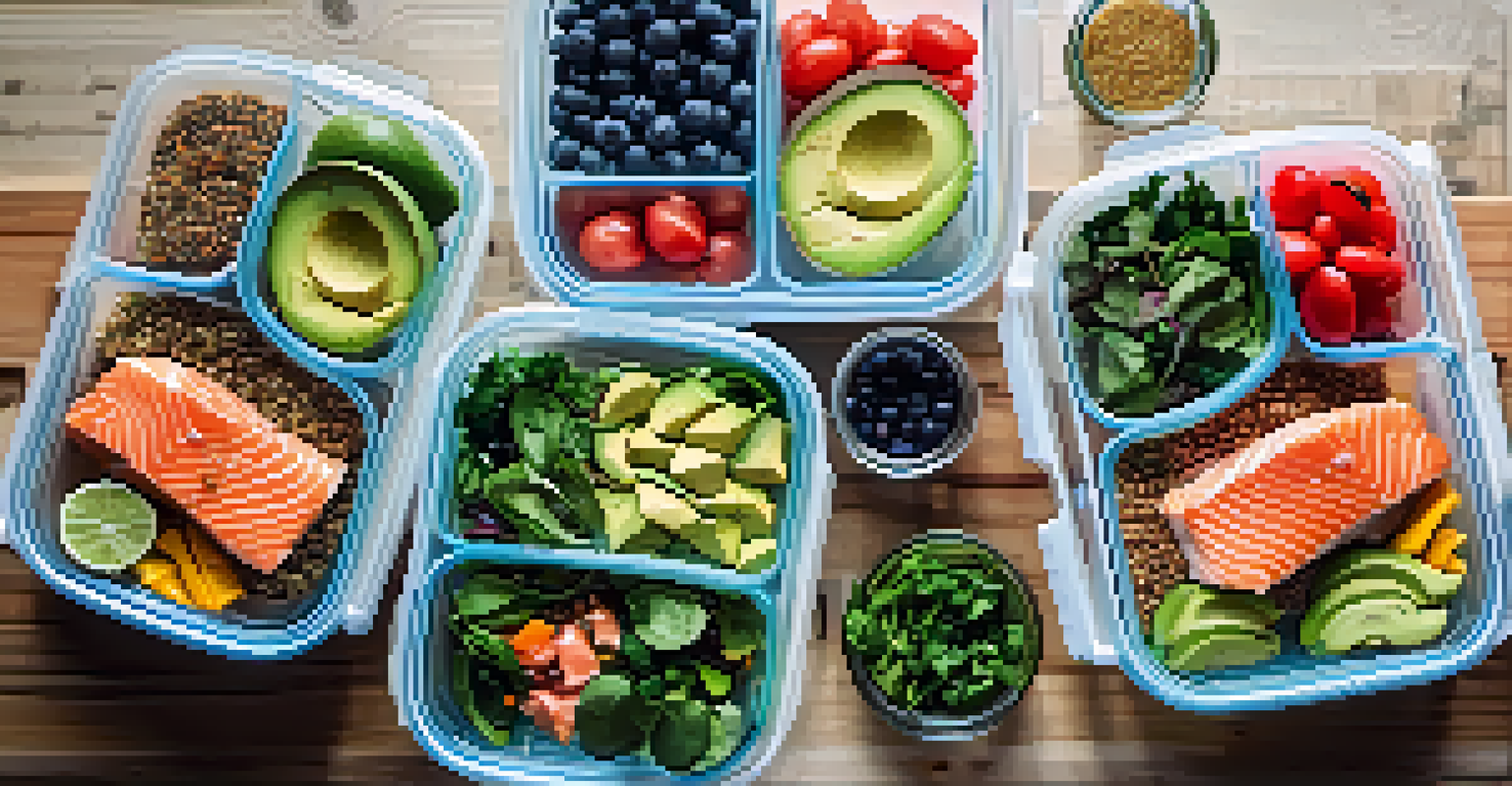Nutrition for Recovery: Preventing Post-Illness Risks

Understanding the Importance of Nutrition for Recovery
Nutrition plays a vital role in recovery after illness. When your body is fighting off an infection or illness, it needs extra nutrients to rebuild and heal. Just like a car needs the right fuel to run smoothly, your body requires a balanced diet to regain its strength.
Let food be thy medicine and medicine be thy food.
After illness, your immune system may be weakened, making you susceptible to further health issues. Proper nutrition can help bolster your defenses, ensuring you have the energy and resources needed to recover fully. Think of it as fortifying your home after a storm; a little preparation goes a long way.
Incorporating a variety of foods rich in vitamins, minerals, and proteins can significantly improve your recovery process. The right dietary choices can help replenish lost nutrients and support overall health, making it essential to focus on your nutrition during this time.
Key Nutrients for Post-Illness Recovery
Certain nutrients are particularly important for recovery after illness. Protein, for instance, is essential for repairing tissues and building new cells. Foods like lean meats, beans, and dairy can provide the necessary protein to aid in healing.

Vitamins and minerals also play crucial roles in recovery. Vitamin C, found in citrus fruits and leafy greens, helps boost your immune system, while zinc, present in nuts and seafood, supports cellular function. Including a variety of colorful fruits and vegetables in your diet can ensure you're getting these vital nutrients.
Nutrition Boosts Recovery
Proper nutrition is essential for rebuilding strength and supporting the immune system after illness.
Don't forget about hydration! Water is often overlooked but is crucial in helping your body flush out toxins and keep your cells functioning properly. Staying hydrated can significantly impact your energy levels, making it easier to engage in light activity as you recover.
Foods to Embrace for a Speedy Recovery
When it comes to recovery, some foods can be particularly beneficial. Whole grains, like brown rice and quinoa, provide energy and fiber, which can aid digestion. Incorporating these grains into your meals can help you feel more satisfied and energized.
The greatest wealth is health.
Additionally, healthy fats found in avocados, nuts, and olive oil can support brain health and reduce inflammation. Think of healthy fats as the oil that keeps your engine running smoothly; they help your body function optimally during recovery.
Finally, consider incorporating probiotic-rich foods like yogurt and fermented vegetables into your diet. These foods can aid in restoring gut health, which is crucial after illness, as a healthy gut can enhance your immune response.
Foods to Avoid During Recovery
While some foods can aid recovery, others can hinder it. Processed foods high in sugar and unhealthy fats can lead to inflammation and weaken your immune response. Think of these foods as obstacles on your recovery path; they can slow you down when you need to pick up the pace.
Alcohol is another item to avoid during recovery. It can dehydrate you and disrupt your sleep, both of which are essential for healing. Limiting alcohol consumption during this time can help your body focus on recovery without unnecessary distractions.
Key Nutrients Matter
Incorporating proteins, vitamins, and hydration into your diet can significantly enhance the recovery process.
Lastly, be cautious with caffeine. While a small amount can provide a temporary energy boost, too much can lead to anxiety and disrupt your sleep patterns. Moderation is key; listen to your body and adjust your intake accordingly.
The Role of Meal Timing in Recovery
Meal timing can significantly influence your recovery process. Eating smaller, more frequent meals rather than three large ones can help maintain your energy levels throughout the day. This approach ensures your body receives a steady supply of nutrients, which can be particularly beneficial during recovery.
Try to schedule meals around your energy levels. If you notice certain times of the day when you feel more fatigued, adjust your meal times to coincide with when you typically feel more alert. This way, you can optimize your nutrient intake and make it easier to consume the foods you need.
Additionally, pay attention to post-workout nutrition if you’re gradually resuming physical activity. Consuming a mix of carbohydrates and protein after light exercise can help replenish glycogen stores and support muscle recovery, paving the way for a smoother return to your routine.
The Importance of Listening to Your Body
One of the most crucial aspects of recovery is tuning into your body's needs. Everyone's recovery journey is different, and it's essential to listen to what your body is telling you. If certain foods don't sit well with you or if you're craving specific nutrients, consider adjusting your diet accordingly.
Mood and energy fluctuations can also be indicators of your nutritional needs. For instance, if you find yourself feeling low on energy, it could be a sign that you need more carbohydrates or hydration. Keeping a food diary can help you track how different foods affect your mood and energy levels.
Listen to Your Body's Needs
Tuning into your body and adjusting your diet according to energy levels and cravings is crucial for effective recovery.
Remember, recovery isn't just about what you eat but also about how you feel. Don't hesitate to reach out to a healthcare professional or a nutritionist if you need guidance tailored to your individual needs.
Creating a Balanced Recovery Plan
To ensure a successful recovery, consider creating a balanced nutrition plan. This plan should include a variety of foods from all food groups, ensuring you're covering all your nutritional bases. A colorful plate often indicates a well-rounded meal, so aim for diversity in your food choices.
In addition to solid foods, consider incorporating smoothies or soups, especially if you're experiencing a decreased appetite. These options can be packed with nutrients while being easier to consume. Think of them as a comforting hug for your digestive system.

Lastly, don't forget to set realistic goals for your recovery. It's essential to be patient with yourself and recognize that healing takes time. Celebrate small victories along the way, and remember that nourishing your body is a significant step toward feeling your best again.